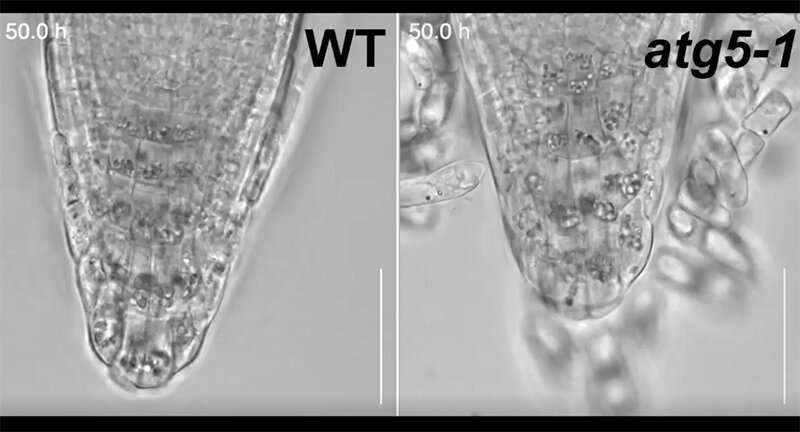A new role of autophagy in plant cell differentiation revealed

A midlife career change is hard to pull off, because it can involve reinventing yourself and adopting a completely new professional role. Now, researchers from Japan show that some plant cells get a helping hand from autophagy when they switch primary functions partway through their lifespan.
In a study published in Development, researchers from Nara Institute of Science and Technology revealed that autophagy—self-digesting machinery that operates inside of eukaryotic cells—plays a crucial role in root growth. That is, autophagy supports root cap cells transition from the center of the cap, where they act as gravity sensors, to the outside of the cap, where they function as secretory cells and eventually slough off.
Root cap cells are unique among plant cells in that they are subject to constant turnover, while most of the other cells that make up the plant body are maintained throughout the plant’s life. As the roots grow and lengthen, the outermost cells on the root cap slough off, and inner cells take their place, changing function as well as location.
“The concerted cell turnover and functional specialization of root cap cells require sophisticated subcellular reorganization,” explains Tatsuaki Goh, lead author of the study. “However, the spatiotemporal dynamics of this reorganization and the molecular and genetic regulation of this process are not well characterized.”
To investigate this process of subcellular reorganization, the researchers designed a microscopy technique that allowed them to watch Arabidopsis roots grow in real time while automatically tracking the tip of the extending root.
“What we saw is that, right before the outermost layer of cells sloughed off of the root tip, there was a major shift in the location of organelles within the cells,” says Keiji Nakajima, senior author of the study. “Importantly, the autophagy system needed to be intact for this shift to take place.”
Having a functional autophagy system was also required for the cells to separate from the root caps in a highly ordered manner.
“Our findings suggest that autophagy is an essential component of cell clearance and organelle rearrangement. These are both associated with the functional specialization of the outermost root cap cells as secretory cells, as well as with the cell separation process,” says Goh.
Autophagy is an evolutionarily conserved process in eukaryotic cells, where it plays key roles in nutrient recycling and the stress response, although its role is less well understood in plants. Thus, the novel role for autophagy in plants revealed by this study has important implications for the conservation of core autophagy factors in plant genomes.
How invading pathogens switch off plant cells’ defenses
Tatsuaki Goh et al, Autophagy promotes organelle clearance and organized cell separation of living root cap cells in Arabidopsis thaliana, Development (2022). DOI: 10.1242/dev.200593
Provided by
Nara Institute of Science and Technology
Citation:
A new role of autophagy in plant cell differentiation revealed (2022, July 6)
retrieved 6 July 2022
from https://phys.org/news/2022-07-role-autophagy-cell-differentiation-revealed.html
This document is subject to copyright. Apart from any fair dealing for the purpose of private study or research, no
part may be reproduced without the written permission. The content is provided for information purposes only.
For all the latest Science News Click Here
For the latest news and updates, follow us on Google News.

